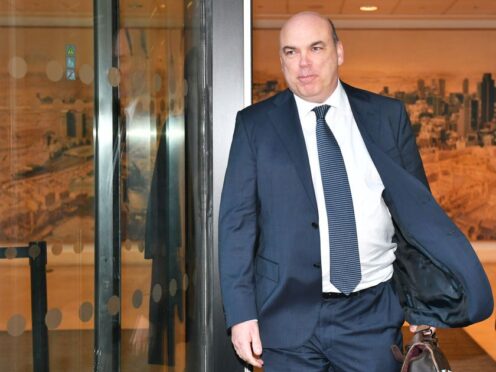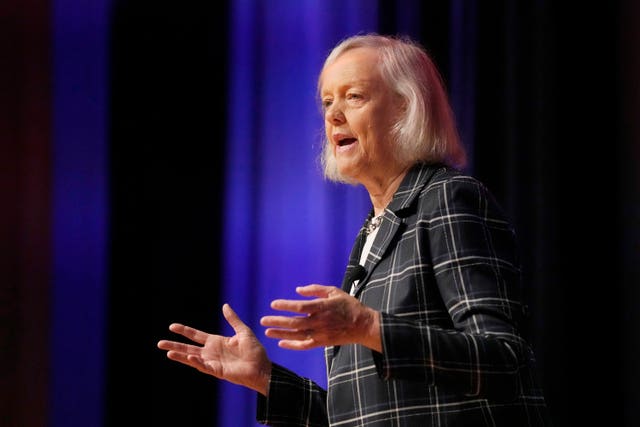
Prosecutors in the US have painted British former tech star Mike Lynch as the ruthless mastermind of an 11-billion-dollar (£8.64 billion) deal that allegedly defrauded Silicon Valley pioneer Hewlett-Packard (HP).
But his lawyer depicted him as a visionary who was made a scapegoat for a desperate buyer’s bad decision.
The contrasting portraits of Lynch, 58, emerged at the start of a criminal trial revolving around HP’s 2011 acquisition of British software maker Autonomy — a deal that was initially celebrated as a coup, but instead unravelled into a costly debacle.
Lynch, once hailed as an example of British ingenuity, is facing 16 felony counts of fraud and conspiracy that could send him to prison for more than 20 years if a jury convicts him of all charges.
The trial in San Francisco federal court is scheduled to last two to three months.
Although the trial is mostly about Lynch’s 16-year reign that culminated in his 2012 sacking by then-HP chief executive Meg Whitman just nine months after the takeover, the proceedings will also cast a spotlight on the chaos at a famous Silicon Valley company.
Ms Whitman’s predecessor, Leo Apotheker, snapped up Autonomy as part of a plan to lessen HP’s dependence on selling personal computers and printers amid the upheaval unleashed by the rise of the smartphone.
But after the deal devolved into a financial scandal, Ms Whitman laid off thousands of workers as HP’s fortunes dipped, leading eventually to the company being split in two in 2015.
Lynch’s lawyer, Reid Weingarten, focused on HP’s deteriorating condition in 2011 as the primary reason the company sought to complete the Autonomy acquisition without even conducting a thorough review of the business.
Things were so bad, Mr Weingarten told the the jury, that Apotheker had likened HP to a “burning platform” in the ocean. Meanwhile, Ms Whitman, he said, had praised Autonomy’s products as “magical software”.
“HP was in desperate shape, so they needed to do something,” Mr Weingarten told the jury during his hour-long opening statement.

In his 80-minute opening statement, federal prosecutor Adam Reeves asserted Lynch started lying to HP executives as soon as deal discussions began with an early 2011 meeting held at HP’s headquarters in Palo Alto, California — the same city where Bill Hewlett and Dave Packard started the company in 1939.
“It was the scene of an 11-billion-dollar fraud,” Mr Reeves said of that initial meeting between Lynch and HP executives. Although Lynch made it seem like he was running a “money-making machine,” Mr Reeves said, “Autonomy’s success was in fact an elaborate multilayered, multiyear fraud.”
Mr Reeves said the prosecution will present witnesses who will explain how Autonomy cooked its books and engineered a variety of deals to inflate its revenue in illegal ways during a two-and-a-half-year period that duped HP into paying for an acquisition it would come to rue. And Lynch orchestrated the skulduggery, according to Mr Reeves.
“He was a dominating, controlling boss,” Mr Reeves told the jury. “For many years, he ran Autonomy with an iron fist.”
Although he acknowledged Lynch is a “hard charger” who demanded the best from his employees, Mr Weingarten said Lynch delegated most accounting and marketing issues while he focused primarily on innovation.
“Mike was ahead of everybody for a long time,” Mr Weingarten said. “He is a startup guy who liked to be eating cold pizza at two in the morning while inventing something.”
Mr Weingarten also showed the jury an internal HP document drawn up in July 2011 — a month before the acquisition was announced — valuing Autonomy at 46 billion dollars (£36 billion), suggesting the assessment showed HP thought it was getting a bargain to acquire the rights to software that helped businesses find information buried in emails and Word documents.
Autonomy’s “software was so powerful that no competitor was near them and it sold like hotcakes”, Mr Weingarten said.
Lynch, who has been free on 100-million-dollar (£78.5 million) bail since being extradited to the US last May, sat stoically through most of the opening statements while looking at presentations appearing on a display and occasionally peering at the lawyers and jury.
The jury eventually will get to hear from Lynch, who Mr Weingarten promised will give evidence to tell his side of the story.
“We want you to know him, we think that helps us,” Mr Weingarten said.
The evidence will likely open the door for prosecutors to drill down into Lynch’s motives for making a deal from which he earned more than 800 million dollars (£628 million), according to court documents.
Apotheker, who was replaced by Ms Whitman a few weeks after the Autonomy deal was announced, is also expected to give evidence.
Ms Whitman, currently the US ambassador to Kenya, is not expected to come to court during the trial, although her management of HP and the Autonomy takeover is expected to be placed under a microscope.
Lynch’s trial will simultaneously cover fraud allegations made against Stephen Chamberlain, Autonomy’s former vice president of finance.

Enjoy the convenience of having The Sunday Post delivered as a digital ePaper straight to your smartphone, tablet or computer.
Subscribe for only £5.49 a month and enjoy all the benefits of the printed paper as a digital replica.
Subscribe